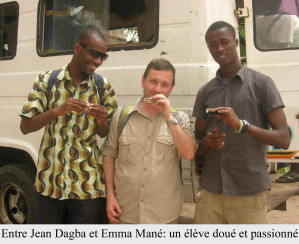 It
has been already 2 years since I discovered Jean Dagba thanks to a
musical slideshow appeared on YouTube: this young teacher founded the
very first school of harmonica 100 % African. EHD is the school of
Harmonica of Dakar introduced by the magazine H2F n ° 16...
It
has been already 2 years since I discovered Jean Dagba thanks to a
musical slideshow appeared on YouTube: this young teacher founded the
very first school of harmonica 100 % African. EHD is the school of
Harmonica of Dakar introduced by the magazine H2F n ° 16...
Since then, I got the support of sixteen people, further to a first call of my part. They gave principally harmonicas, new and occasion to the school. These harmonicas all were delayed in Dakar, in person of confidence, by my Swiss friend Roland Fessler, the French Eric Frèrejacques, "Bob" a Congolese friend of Jean and by me during my very first visit on the African soil, last from May 28th till June 3rd.
Why did I wait for so much time to meet Jean? It is necessary to say that my professional past out of France had been adventurous, sometime a bit dangerous. The idea of going alone in Africa with the absolute necessity to share Jean's life, to meet his pupils, to see its school, to realize by myself its difficulties, all merit which he can have, stake, seriousness of this school and its promising future. This idea therefore, so much enthralled me that it worried me because I expected as much a climatic shock as a culture shock. This first visit, alone (though welcomed by a friend and his family) on the African soil, represented a dive nonetheless in the unknown...
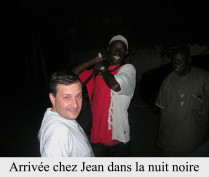 Vaccine
against yellow fever, medicaments of all takes out carefully prepared
backpack. Twenty minutes before departure, a message of "Bob" on
Facebook: Especially when you arrive at Dakar, let nobody take your
bag, trust to person (Oops Thanks Bob)! ...
Vaccine
against yellow fever, medicaments of all takes out carefully prepared
backpack. Twenty minutes before departure, a message of "Bob" on
Facebook: Especially when you arrive at Dakar, let nobody take your
bag, trust to person (Oops Thanks Bob)! ...
And indeed, after ten hours of trip, the arrival to Dakar at about 21 h was unforgettable. I laugh at it willingly with detachment. I cut my original article here since the translation from French to English took me a bit time already. I guess you are more interested by the harmonica than by my own adventure so I don't give the details of the funny arrival at the airport.
The arrival at home of Jean took place at night, after a very nice trip of barely 30 minutes, to arrive with one of these power failures, habitual here. During presentations, I have a light disadvantage, because if I am of a white bursting in this night without moon, I see eyes especially to them but for milk them of faces it is more difficult. What makes them laugh a lot!
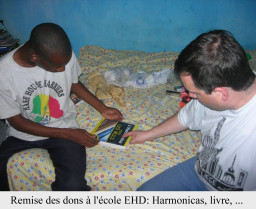 After
this reception, a very good meal of rice and fish (speciality of the
Senegal), though having already well eaten on the plane: I cannot
resist the pleasure of making discover to Jean the last presents of the
generous donors, which one more time one highlighted solidarity between
enthusiasts of the small magical instrument. About 50 harmonicas in the
most various states, but one of the purposes of my visit is to
teach to Jean how to build a harmonica from valid rooms, then to adjust
them with the aid of tools fabricated by Laurent Cagnon that Eric
Frèrejacques in bringing and of the small magical tuner?!??? that an
employee of the airport will have flown in my bag!!! It is at the same
time a disappointment for me and for Jean, but for the rest, everything
is there, including the book "the harmonica for the dummies", which is
not a method (Jean already has that of Sebastien Charlier) but a very
good very useful complement, as well as some very French specialities
which are served. The cheese was perhaps not the best idea for stomachs
not used to...
After
this reception, a very good meal of rice and fish (speciality of the
Senegal), though having already well eaten on the plane: I cannot
resist the pleasure of making discover to Jean the last presents of the
generous donors, which one more time one highlighted solidarity between
enthusiasts of the small magical instrument. About 50 harmonicas in the
most various states, but one of the purposes of my visit is to
teach to Jean how to build a harmonica from valid rooms, then to adjust
them with the aid of tools fabricated by Laurent Cagnon that Eric
Frèrejacques in bringing and of the small magical tuner?!??? that an
employee of the airport will have flown in my bag!!! It is at the same
time a disappointment for me and for Jean, but for the rest, everything
is there, including the book "the harmonica for the dummies", which is
not a method (Jean already has that of Sebastien Charlier) but a very
good very useful complement, as well as some very French specialities
which are served. The cheese was perhaps not the best idea for stomachs
not used to...
A night passes and I am awakened at 5 by the call to pray. No doubt I wake up in Dakar! Jean has fun of my surprise; himself is Christian Methodist living Muslim in a community in 95 %.
Shortly after breakfast, Jean wants to show me the cultural centre where he went to play with his pupils during the recent visit of Eric Frèrejacques. This is going to be a tremendous human experience, because a representative for the centre who comes to greet us asks Jean if he has a harmonica with him. Purpose is to thank the children, about 3 classes 3 - 8 years old which are making presents for the mothers feast taking place on following Sunday. Jean has his, but in haste, I left mine in my trousers at his home. We need 20 minutes to get it and to decide on what is going to be played, for the first time together! "Oh when the Saints", "Oh Suzanna". Until then no surprise and finally a piece of Jean which he calls "Blues of Africa", that begins simple blues with an improvisation with these bending making the charm of the diatonic, and ends by one question answer to the fashion of the djembe (The djembe is an instrument very played here) ...
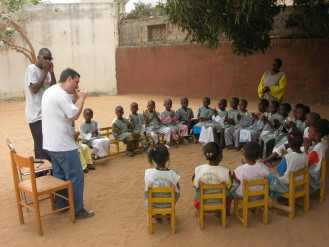 On
the way back we meet facing 23 children and their teacher, perfectly
disposed iron on horseback. Jean, who is teacher himself, begins by
explaining to the children that it is about an exchange. He asks 3
volunteers to sing us things which they learnt in year. After some
seconds of hesitancy a small boy gets up and begins singing. Jean
whispers me that it is about the hymn of the Senegal Applauses! A small
girl sings us another song. It is in our turn to play, I begin with "Oh
Suzanna", a bit impressed nevertheless by these surprised children by
the harmonica and the very pale guy in me! I am very quickly joined by
Jean, who is proudly carrying the harmonica rack given by Roland the
Swiss, knocking in the hands by playing, by making the Childs and the
teacher participate while the representative for the centre takes
photos of us. Each of 3 pieces ends under applauses given with the
children. Then they start instantly singing new songs; taken out from
their bashfulness, the teacher says to them «it is good the children,
thank you», but it is not possible to stop them any more ... All songs
learnt in year chain themselves! I am conscious to live an intense and
unforgettable instant! Jean is very happy with such success himself and
we
On
the way back we meet facing 23 children and their teacher, perfectly
disposed iron on horseback. Jean, who is teacher himself, begins by
explaining to the children that it is about an exchange. He asks 3
volunteers to sing us things which they learnt in year. After some
seconds of hesitancy a small boy gets up and begins singing. Jean
whispers me that it is about the hymn of the Senegal Applauses! A small
girl sings us another song. It is in our turn to play, I begin with "Oh
Suzanna", a bit impressed nevertheless by these surprised children by
the harmonica and the very pale guy in me! I am very quickly joined by
Jean, who is proudly carrying the harmonica rack given by Roland the
Swiss, knocking in the hands by playing, by making the Childs and the
teacher participate while the representative for the centre takes
photos of us. Each of 3 pieces ends under applauses given with the
children. Then they start instantly singing new songs; taken out from
their bashfulness, the teacher says to them «it is good the children,
thank you», but it is not possible to stop them any more ... All songs
learnt in year chain themselves! I am conscious to live an intense and
unforgettable instant! Jean is very happy with such success himself and
we 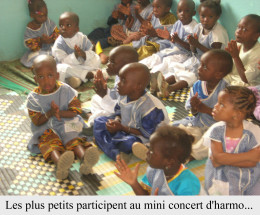 decide
not to leave 2 other classes in rest. The smallest are very amusing. I
lean towards those who stare at me as if to play only for them; they
return me from broad grins, look me around them very proud and fidgety
as if to say: "You see the man, he plays for me"!... Exchanges with the
children are difficult to explain, it is huge! I have the feeling that
certain will remember of this instant and the harmonica. Jean and me
played together the same pieces for 3 classes, thanked by the teachers
happy with this recess. It has been a chance for me to note that Jean
himself in self-educated person, has a good workmanship of his
instrument, but also the recognition of the representatives for the
cultural centre who do not hesitate to ask him such things.
decide
not to leave 2 other classes in rest. The smallest are very amusing. I
lean towards those who stare at me as if to play only for them; they
return me from broad grins, look me around them very proud and fidgety
as if to say: "You see the man, he plays for me"!... Exchanges with the
children are difficult to explain, it is huge! I have the feeling that
certain will remember of this instant and the harmonica. Jean and me
played together the same pieces for 3 classes, thanked by the teachers
happy with this recess. It has been a chance for me to note that Jean
himself in self-educated person, has a good workmanship of his
instrument, but also the recognition of the representatives for the
cultural centre who do not hesitate to ask him such things.
The following day, 2nd day of my presence in Africa, I am in Jean's church together with 23 persons, missionaries as Jean, getting ready to return their monthly visit in a village in 100km in the East, that is 4 am of road in "Ndiaga-Ndiaye": this lorry of 32 places decorated with numerous drawings, transfers and other good-luck charm I am encircled with 23 persons singing canticles, djembe two answering, of Jean's harmonica and mine, but also harmonica of Emmanuel Mane, a young hope of the school EHD in the eyes that I cannot almost determine the spark of passion for the harmonica. In spite of very strong ambience, my barely audible harmonica, the face showed that he pointed out all my bends! I could really feel his desire to succeed in making the similar! This second day really reinforced me due to the fact that Jean is encircled with students with a real desire to control the harmonica, and who will arrive at it beyond number of harmonica lovers of our land to which I do not point out willy-nilly or seldom the same level of passion 4 hours to go more 4 on the way back; you must think that I had the head «as one watermelon» with this rhythm indeed uninterrupted! But not! Discover the Senegalese campaign, people who turn round in our passage agreeably surprised by our festive ambience, the African music, some rules of which I discover by immersion, Jean's interventions which show an example of the contribution of the harmonica in African music, Mbalax, claimed by the organizers of trip, exchanges it and the purpose of their mission which is not without reminding me of the life of a cousin of my grandmother; not Protestant, Catholic but however. I am still smiling at the memory of this air-conditioned bus by French tourists remaining at our level hanging loan of one minute to be able better to film us with their camcorders ...
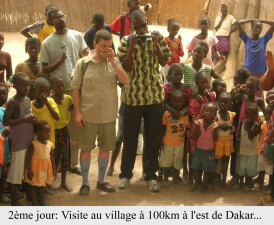 I
must pass fast on the details of arrival to the village, in the desert,
the horde of children who run behind the lorry. Once more I don't give
more details there except that I am a bit embarrassed and affected at
the same time by the reception and honours made to me. In comer Jean
and I were invited to participate in songs, a dance in round with the
adults of the village, with our harmonicas which one more time
intrigued our guests, especially the children. As that our small
instrument shows itself to in villages of the Senegal; little by little
it is admitted... The following day was the occasion at church for Jean
to introduce me to the assistance. He explained me the surprise of the
Senegalese who did not understand what a French engineer made if far
from the hotels where they have habit to stay. That is why I was
nicknamed "Senegaulois". I will be delighted to narrate you another
time of many details of this tremendous experience among the
Senegalese...
I
must pass fast on the details of arrival to the village, in the desert,
the horde of children who run behind the lorry. Once more I don't give
more details there except that I am a bit embarrassed and affected at
the same time by the reception and honours made to me. In comer Jean
and I were invited to participate in songs, a dance in round with the
adults of the village, with our harmonicas which one more time
intrigued our guests, especially the children. As that our small
instrument shows itself to in villages of the Senegal; little by little
it is admitted... The following day was the occasion at church for Jean
to introduce me to the assistance. He explained me the surprise of the
Senegalese who did not understand what a French engineer made if far
from the hotels where they have habit to stay. That is why I was
nicknamed "Senegaulois". I will be delighted to narrate you another
time of many details of this tremendous experience among the
Senegalese...
During this intense week I could visit historical and tourists points, of course, and meet people. France also had a common history with this country as everyone knows ...
Every day in our return of walk, we received pupils' visit of Jean and of neighbours. One of them from Casamance, always dressed such a minister, came to speak harmonica. I gave him full of advice of type: try to play it every day at least 20 minutes, to reproduce songs using your ear only etc. If Jean is missionary, you should not believe as far as his school blends religion and harmonicas because Christian and Muslim are all happy together also thanks to the music and harmonica. All things going with music and harmonica: such tolerance, opening, enthusiasm, brotherhood, joy to share etc ...
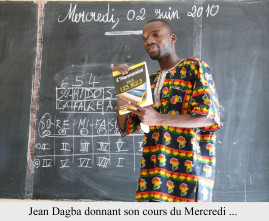 If
the class of Jean for his particular course is its own room, it teaches
in its schoolroom of its primary school except school timetables (since
my passage the class was destroyed, to give birth has a new school, EHD
has to move in other places). The Saturday crossed to the village
allowed me to meet some of his students, but it is only on Wednesdays,
wakefulness of my departure that I could assist its course of
harmonica. New students who can come any time of the year, Jean begins
by making a recall of the review of the harmonica. As the pupils have a
diatonic model for the reasons which are imagined (what they were kind
enough to give them since harmonicas are not only quasi untraceable in
Dakar but beyond their medium financiers), he draws in them 4 holes of
middle in which he disposes notes. This day there, in haste, Jean had
forgotten to bring harmonicas there C (Do) to teach them; the reaction
of David, the new student of 23 years was instantaneous: "But me I have
a harmonica there G (Soil), notes are going to be the same?" I was
filled with enthusiasm by this very pertinent question which proved to
what extent these pupils were interested by subject, actors of course
and simple audience. Jean had announced me his wish which I teach this
day there, and me I wanted to see him making first. My turn succeeded
to take the relay with its agreement...
If
the class of Jean for his particular course is its own room, it teaches
in its schoolroom of its primary school except school timetables (since
my passage the class was destroyed, to give birth has a new school, EHD
has to move in other places). The Saturday crossed to the village
allowed me to meet some of his students, but it is only on Wednesdays,
wakefulness of my departure that I could assist its course of
harmonica. New students who can come any time of the year, Jean begins
by making a recall of the review of the harmonica. As the pupils have a
diatonic model for the reasons which are imagined (what they were kind
enough to give them since harmonicas are not only quasi untraceable in
Dakar but beyond their medium financiers), he draws in them 4 holes of
middle in which he disposes notes. This day there, in haste, Jean had
forgotten to bring harmonicas there C (Do) to teach them; the reaction
of David, the new student of 23 years was instantaneous: "But me I have
a harmonica there G (Soil), notes are going to be the same?" I was
filled with enthusiasm by this very pertinent question which proved to
what extent these pupils were interested by subject, actors of course
and simple audience. Jean had announced me his wish which I teach this
day there, and me I wanted to see him making first. My turn succeeded
to take the relay with its agreement...
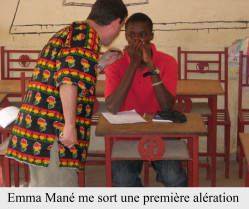 That's
how I spoke to them about the notion of degrees to make understand to
them that by passing from a tonality to the other one, they had so a
means to find the name of notes in the holes of middle. It was a bit
daring in my part but I really smelt them interested. Then I went
around the class to hear them to play individually a simple and pure
note: basic condition before trying to enrich its possibilities by
means of bends that I tried to explain them with the help of the book
«the harmonica for the no». Without bends, it is easy to lose patience
since the lack of notes, but with it becomes difficult to cancel the
harmonica so much it becomes exciting to go farther to the discovery of
the secrets of the small magical instrument!... The players of diatonic
all passed by this stage of frustration that can last of months,
fortunately often much less for a long time I concluded my intervention
by disassembling to them a diatonic, to explain them how they work, the
importance of the distance of reeds, the traces of filing which were
necessary to adjust the height of every note but which proves to be a
delicate operation where the tuner would have been very useful, just as
to show what is a bending. On both photos they see Emma achieving a
first bending of the hole 5 and his small sister and David (the new)
very interested by the heart of the harmonica. Then Jean taking back
the hand, he asked some pupils who had prepared pieces, of whom Emma
Diatta who wanted to pass to play his piece in front of us for 5
minutes before to join his job then ...
That's
how I spoke to them about the notion of degrees to make understand to
them that by passing from a tonality to the other one, they had so a
means to find the name of notes in the holes of middle. It was a bit
daring in my part but I really smelt them interested. Then I went
around the class to hear them to play individually a simple and pure
note: basic condition before trying to enrich its possibilities by
means of bends that I tried to explain them with the help of the book
«the harmonica for the no». Without bends, it is easy to lose patience
since the lack of notes, but with it becomes difficult to cancel the
harmonica so much it becomes exciting to go farther to the discovery of
the secrets of the small magical instrument!... The players of diatonic
all passed by this stage of frustration that can last of months,
fortunately often much less for a long time I concluded my intervention
by disassembling to them a diatonic, to explain them how they work, the
importance of the distance of reeds, the traces of filing which were
necessary to adjust the height of every note but which proves to be a
delicate operation where the tuner would have been very useful, just as
to show what is a bending. On both photos they see Emma achieving a
first bending of the hole 5 and his small sister and David (the new)
very interested by the heart of the harmonica. Then Jean taking back
the hand, he asked some pupils who had prepared pieces, of whom Emma
Diatta who wanted to pass to play his piece in front of us for 5
minutes before to join his job then ...
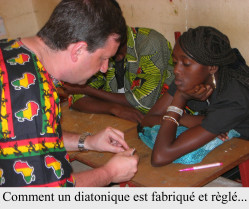 The
end of course which lasted much more than the hour of base took place
in a jam session with a nice guitarist, Mamadou Badji of «Ecole
National des Beaux Arts » from Dakar and Jean-Claude the player of
djembe. It was a chance for me to introduce our approach in Occident
and I magine elsewhere: listen to the tune played by the guitarist,
spot the tonality of the piece to choose the most advantageous tonality
of harmonica, do not play without any silence, silence is also music,
be able to listen, respect other musicians, exchange...
The
end of course which lasted much more than the hour of base took place
in a jam session with a nice guitarist, Mamadou Badji of «Ecole
National des Beaux Arts » from Dakar and Jean-Claude the player of
djembe. It was a chance for me to introduce our approach in Occident
and I magine elsewhere: listen to the tune played by the guitarist,
spot the tonality of the piece to choose the most advantageous tonality
of harmonica, do not play without any silence, silence is also music,
be able to listen, respect other musicians, exchange...
My plans of origin being to teach to Jean and his students to adjust harmonicas, build an harmonica from faulty harmonicas among those he accepted, the stolen tuner did not help me, in a place where even a measuring metre is very difficult to find. Parties were less loaded as well as envisaged. I was therefore sure that Jean was aware of possible consequences of his sudden celebrity via Internet to the worldwide "Harmonica" community. By seeing the world opening to him, of harmonica players gifted and admitted visiting it of France, of the United States, of Switzerland, of Brazil, logical tendency would be to climb more and more high a «small pink cloud» with a growing impression of easiness and of security, worldwide support and permanence assured by its school with always more and more pupils from everywhere! But risks become then numerous: The enthusiasm of crossed discovery, the foreigner quickly made to form an opinion on the school through the mirror distorting that represent his own culture, his references often brought forward with way of life in Africa, notion of time, the social reports, customs, the history of the country and I forget it willy-nilly!...
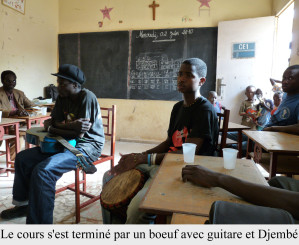 It
is also necessary to take into account danger of the already seeing,
not to reproduce diagrams reminding of the time of colonisation or of
the Westerners wanted to learn to the African to cultivate the earth of
their ancestors, to live according to a model getting closer to our
references, a type of France / Africa for harmonica. To help the
EHD school, to collaborate, to exchange seem natural, but according to
the way of making Jean is always necessary have control and merit of
HIS school. He has never attended a course in Occidental fashion, does
not know how it takes place but must teach for his/her part and get a
progress of his pupils. African would have willy-nilly the same
approach in education respecting its culture, its customs, respecting
its history etc? teach tablatures if it is to give not Senegalese but
American, French, German, Irish pieces. Jean would better not move too
far away from which would be the best in adapting with African music,
Mbalax. It is then possible to ask question of how to help indeed?
Materially it is clear that if Jean teaches to 15 students in a course
he would require a set of 15 diatonic harmonicas in the most common
tonalities, why not 15 chromatic harmonicas for case where he would
also like to teach the practice of the chromatic: That every student
uses the same instrument as his neighbour. Fact to learn to knock up,
to regulate harmonicas makes left passion, and is all the more useful
on a continent where shops do not sell harmonica, where the online
purchase proves to be too expensive and African post office is packed
with opening packages (I have to manage so that 100 % donations arrive
at it in hands clean). In conclusion interesting debate is: how it is
possible to the EHD School without harming it, and thereabouts helps
Jean to maintain the passionate home which will make other babies in
Africa. At the Beginning of September Jean visited 3 old Beninese who
would follow his example well. Who knows?! ...
It
is also necessary to take into account danger of the already seeing,
not to reproduce diagrams reminding of the time of colonisation or of
the Westerners wanted to learn to the African to cultivate the earth of
their ancestors, to live according to a model getting closer to our
references, a type of France / Africa for harmonica. To help the
EHD school, to collaborate, to exchange seem natural, but according to
the way of making Jean is always necessary have control and merit of
HIS school. He has never attended a course in Occidental fashion, does
not know how it takes place but must teach for his/her part and get a
progress of his pupils. African would have willy-nilly the same
approach in education respecting its culture, its customs, respecting
its history etc? teach tablatures if it is to give not Senegalese but
American, French, German, Irish pieces. Jean would better not move too
far away from which would be the best in adapting with African music,
Mbalax. It is then possible to ask question of how to help indeed?
Materially it is clear that if Jean teaches to 15 students in a course
he would require a set of 15 diatonic harmonicas in the most common
tonalities, why not 15 chromatic harmonicas for case where he would
also like to teach the practice of the chromatic: That every student
uses the same instrument as his neighbour. Fact to learn to knock up,
to regulate harmonicas makes left passion, and is all the more useful
on a continent where shops do not sell harmonica, where the online
purchase proves to be too expensive and African post office is packed
with opening packages (I have to manage so that 100 % donations arrive
at it in hands clean). In conclusion interesting debate is: how it is
possible to the EHD School without harming it, and thereabouts helps
Jean to maintain the passionate home which will make other babies in
Africa. At the Beginning of September Jean visited 3 old Beninese who
would follow his example well. Who knows?! ...
Having lived one week among them, accepted the visit from most students saying to me all the biggest well about Jean and about his school I am more optimist than ever, of a way reflected with understanding that my trip in Dakar allowed me to acquire. What worries me, it are the capacities of the world to understand the reality of things, that it is normal that progress is slower in a country where the harmonica is only appearing, the professor learns to teach an instrument which he controls, but that he continues discovering himself, where courts are synonymous with festive gathering where a happy pupil will naturally start to sing and to dance in the middle of the class to show his joy, as I saw Badiane making right in the middle of course in front of passionate students. It is normal, it is Africa! Africa full of promises, where I already see progress: at least 3 pupils who bend since June and who progress, like the owner of a cyber coffee which phoned me in day to play (very well) some tune in the harmonica for me...
The day of departure, several pupils crossed the city to say to me goodbye. In the airport, spontaneity got outside to us our harmonicas at the same time, without a word, we had understood each other. Jean Dagba and I played «It is only one goodbye» under benevolent look of many African present and of Badiane which had wanted to accompany us. Indeed the first one here between a Senegalese and French. Thermal and cultural shocks of arrival had been transformed into pinch of departure with haste to return one day to see again my new friends.
I thank warmly Jean and all his family with which I had a superb week. I don't give the details here but they are all involved in actions very useful to their compatriots. His sister helps at culture in Dakar a lot, his brother help children and Jean who, besides to teacher, can do works of translation into German including via Internet. A family full of initiatives...
Thank you also to the pupils of Jean who by their constant progress, show the effectiveness of E.H.D ...
 |
 |
 |  |